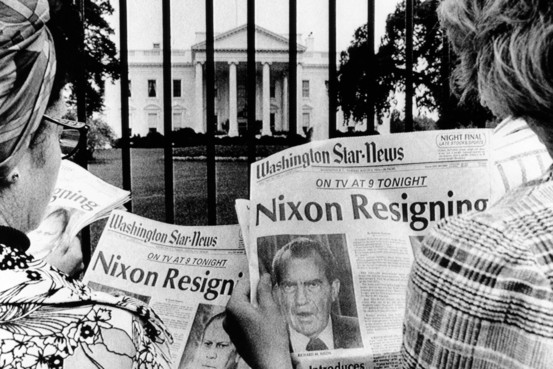Why Watergate Lives On 40 Years After Nixon Resignation
< < Go Back
Political Cynicism and Partisan Divide Took Root During Tumultuous Era.
A new book by John Dean, White House counsel during the Watergate trauma, lands with a thud on your desk, and a reasonable reaction is: There is no way I’m reading 635 pages on a 40-year-old scandal.
But hold on. Dive into the story in “The Nixon Defense”—the most complete account yet of what happened in the White House after the Watergate break-in, based on the full set of secret Oval Office recordings—and its characters are as vivid, compelling and tawdry as ever.
More important, the saga is a reminder of why Watergate—along with the assassination of John Kennedy, the Vietnam War and the 9/11 terror attacks—remains one of a handful of searing experiences that shaped modern public life in America. Watergate in particular forced changes in the country’s political course that live on today.
All this comes to mind because this week marks the 40th anniversary of the climax of the Watergate saga, the resignation of President Richard Nixon. That act is unmatched in American history.
the memory matters because Watergate, coming as it did in tandem with the final throes of the Vietnam War, ushered in an age of cynicism that persists.
“I think it really just made people so cynical about politics and politicians,” says Robert Dallek, a historian who specializes in the presidency. “It just deepened the feeling that government is not to be trusted.”
On a more practical level, the backlash from the abuses that marked Watergate produced congressional passage of a series of measures designed to rein in presidential power: the War Powers Resolution, new campaign-finance rules, new budget procedures, the creation of the Congressional Budget Office and the independent-counsel statute.
Whatever one thinks of those steps, they have helped shape the balance of power in Washington in the four decades since. In fact, every president since has tried to claw back some of the power lost to the Watergate reforms, setting off tensions punctuated now by the current attempt by the House of Representatives to sue President Barack Obama for overstepping his executive powers.
On a more human level, Watergate led directly to the election in 1974 of a large class of young Democratic members of Congress—the Watergate babies—who came to dominate the institution for much of the ensuing four decades. Indeed, two remaining prominent members of that class, California Reps. Henry Waxman and George Miller, are retiring only this year.
In broader political terms, Watergate stopped and then reversed what appeared to an emerging Republican presidential coalition that otherwise might have been cemented by the Nixon landslide of 1972.
“I think what Nixon had put together was the greatest 20th century coalition since FDR,” says Patrick Buchanan, a Nixon White House aide who later ran for president himself. Watergate, he says, “suspended for about five years the growth of the natural new majority we put together in 1972.” Instead, Democrat Jimmy Carter was elected in 1976, and that GOP growth didn’t resume until Ronald Reagan’s election in 1980, he says.
More subtly, Watergate made plausible an action that long had been almost unthinkable: the impeachment of a president. “Now impeachment is tossed around as if it’s just another part of the process,” says former senator and Defense Secretary William Cohen.
Ultimately, though, Mr. Cohen sees a more salutary Watergate legacy: “The lesson I took out of it was that it reaffirmed the rule of law and that nobody is above it. What I took out of it is that this is the thing that binds us.”
More From The Wall Street Journal (subscription required):




